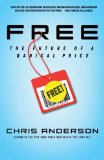Borrowing a Free Lunch
With Michael Jackson’s death, Perez Hilton’s reporting of Michael Jackson’s death, and reporting on Twitter’s reporting of Michael Jackson’s death, it’s hard to think that anything else went on in the world this week.
Die hard cultural connoisseurs may have caught glimpse that Farrah Fawcett also passed away, the NBA draft occurred, the Supreme Court ruled the strip-search of a 13-year-old girl illegal, and violence in Iraq heated up.
If you missed any of those headlines, you can think of yourself as caught up. No news source was wasting pages on these items.
It makes sense then that the Wall Street Journal and the Washington Post hardly wasted a breath – a sentence, a web page – on a story about Chris Anderson’s verbatim use of Wikipedia entries in his new book “Free.” The story, scooped by those literary nerds over at the Virginia Quarterly Review, could not compete with the juicier pieces of the week and was left to cultural irrelevance. No matter that Anderson serves as Editor-in-Chief of Wired magazine nor that he’s author of the NY Times Bestseller, “The Long Tail.”
The short of it:
The VQR realizes that many passages from Chris Anderson’s new book resemble Wiki entries and report on the issue (complete with highlighted comparisons).
Anderson admits to his errors and explains them as oversight during a rushed, final stage of the drafting process. His publisher supports Anderson’s story and apology. Anderson engages with readers of the VQR piece and responds in the comments himself.
For those who think this story is less culturally relevant than Michael Jackson’s death, I hear you. I’ll be the first to admit that the story lacks the appeal of a major celebrity’s death, the circumstances thereof, and the consequences thereto. Surely, it does not reveal who owns the rights to the Beatles songs or the liability of MJ’s personal doctor. However, let me bring up a few talking points – the sexiest that I can think of – to try to persuade you that this news item is as complex as Liza Minelli’s prediction of Michael Jackson’s autopsy results.
1. The LA Times cited to a commenter on Gawker who said, “‘Can’t decide which is more embarrassing — failing to cite Wikipedia as a source or using Wikipedia as a source.’”
Is it irresponsible to research on Wikipedia? Doesn’t this prove that Wikipedia is a go-to source for many people, not only asinine college students who don’t know any better?
Hasn’t the site put in safeguards to make sure the information is accurate and complete? When will it be legitimate to cite to Wikipedia as a source of information without the stigma of lazy college student?
2. The call-and-response function of comments sections on blogs. Anderson manned up to his error and addressed the source itself via comments. If plagiarism lowers our respect or trust for an author, has Anderson’s honesty mitigated these consequences?
3. In a world where Kaavya Viswanatha and Jayson Blair faced massive repercussions for their plagiarism, why haven’t there been more news outlets reporting on Anderson’s actions?
Advertisement








couldn't anderson just say he 'sampled' the entries? perhaps, wikipedia remix??
also, i wonder how many people would have known about his book had it never been exposed. i wonder if that makes Michael Jackson's death bad timing for anderson.